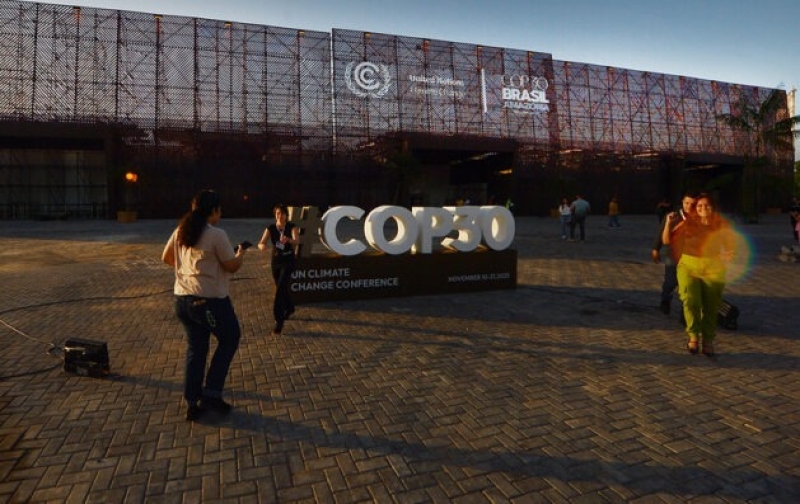- Tarique Rahman’s gratitude to people for welcoming him on his return |
- Attorney General Md Asaduzzaman resigns to contest election |
- Zubayer Rahman Chowdhury takes oath as Bangladesh Chief Justice |
- Iran’s president says his country is in a full-scale war with the West |
- Dhaka’s air turns ‘very unhealthy’ amid fog |
Global South Takes Lead in Climate Transition

Belém—30th Conference of the Parties (COP30).
As world leaders gather in Belém, Brazil for the UN climate conference, expectations remain low. Few anticipate major breakthroughs. The United States is pulling back from climate engagement, Europe is distracted, and the UN is struggling to maintain relevance in the 21st century.
Yet outside the negotiation halls, a different transformation is underway—quiet, practical, and far-reaching. The global green transition is no longer being led by Western capitals. It is being built and scaled in the Global South.
A decade ago, those seeking climate leadership looked to Brussels, Berlin, or Paris. Today, they look to Beijing, Delhi, or Jakarta. The center of gravity has shifted. China and India are now driving the global green economy, with Brazil, Vietnam, and Indonesia advancing rapidly behind them.
This shift is driven not by rhetoric but by outcomes. China now accounts for around 60% of global manufacturing capacity in solar, wind, and hydropower technologies. It leads the world in electric vehicles, battery storage, and high-speed rail. China’s installation of 93 gigawatts of solar power in May 2025 was a global record.
China has turned climate action into economic strategy—creating jobs, industries, and export power. It now earns more from exporting green technology than the United States earns from exporting fossil fuels.
India is also redefining what green development can look like. In Andhra Pradesh, a six-gigawatt integrated renewable energy park combines solar, wind, and pumped hydro storage to deliver 24-hour clean power—something unmatched in the West. In Tamil Nadu, ecotourism projects are protecting mangroves while generating local income. Gujarat has committed to 100 gigawatts of renewable energy by 2030, supported by major private sector investment.
These are not pilot experiments; they are national strategies. And they are succeeding because the economics have changed. The cost of solar power has fallen by more than 90% in the past decade, largely due to intense competition among Chinese manufacturers. Battery storage is now competitive with fossil fuels. In many regions, especially in India, solar-plus-storage is already cheaper than coal.
Climate action is now driven by economics—not diplomacy. The key question is no longer whether countries will shift to clean energy, but who will control the industries that enable the transition.
Europe, once the moral voice of climate politics, risks falling behind industrially. After years of restricting green imports from developing nations, Europe now protests that Chinese electric vehicles are “too cheap” and “too competitive.” The global transition cannot succeed behind protectionist barriers.
Brazil’s President Luiz Inácio Lula da Silva understands this shift. His decision to host COP 30 in Belém, deep in the Amazon, signals a new climate narrative—one that links the protection of rainforests with the livelihoods of the people who depend on them.
Forests are not only carbon sinks; they are active economic systems. Guyana’s jurisdictional REDD+ carbon credit programme, under which carbon credits are sold via global aviation markets, is an example. Revenue flows directly to local communities, funding schools, digital access, and small-scale enterprises. Conservation works when communities benefit directly.
The Global South has also avoided a major political fault line common in Western countries: climate denial. In India, no major political party, public figure, or cultural icon rejects the science of climate change. Across Asia and Latin America, climate action is seen not as a sacrifice, but as progress.
Leaders such as Narendra Modi, Xi Jinping, and Lula da Silva promote climate action as a pathway to prosperity—not austerity. This alignment of ecology and economy explains why many developing nations are moving faster than the industrialized West.
Diplomacy still matters, but global institutions must evolve. The UN Security Council, unchanged since 1945, excludes India and Africa from permanent representation. Without reform, multilateralism risks losing credibility.
Even as negotiations proceed slowly, transformation continues in real economies—from renewable parks in Gujarat to high-speed rail in China, and from mangrove conservation in Tamil Nadu to carbon credit programmes in Guyana.
Belém may not produce a sweeping agreement. But the world is already moving—led by the Global South.
Today’s climate leadership speaks with a southern voice.

